Analyzing UK's Monetary & Fiscal Policy: GDP and Price Level Impact
VerifiedAdded on 2023/06/18
|9
|2585
|149
Essay
AI Summary
This essay examines the implementation and impact of monetary and fiscal policies on GDP and price levels, with a focus on the United Kingdom. It discusses how central banks use monetary policy to stimulate or check economic growth through interest rates and money supply management. Fiscal policy, involving government spending and taxation, is also analyzed for its role in promoting sustainable growth and managing economic crises. The essay further investigates whether fiscal policy remains a key instrument in the UK during crises, considering its advantages and disadvantages in controlling inflation and stimulating economic activity. It concludes that both monetary and fiscal policies are essential tools for governments to manage recession periods and maintain economic stability.
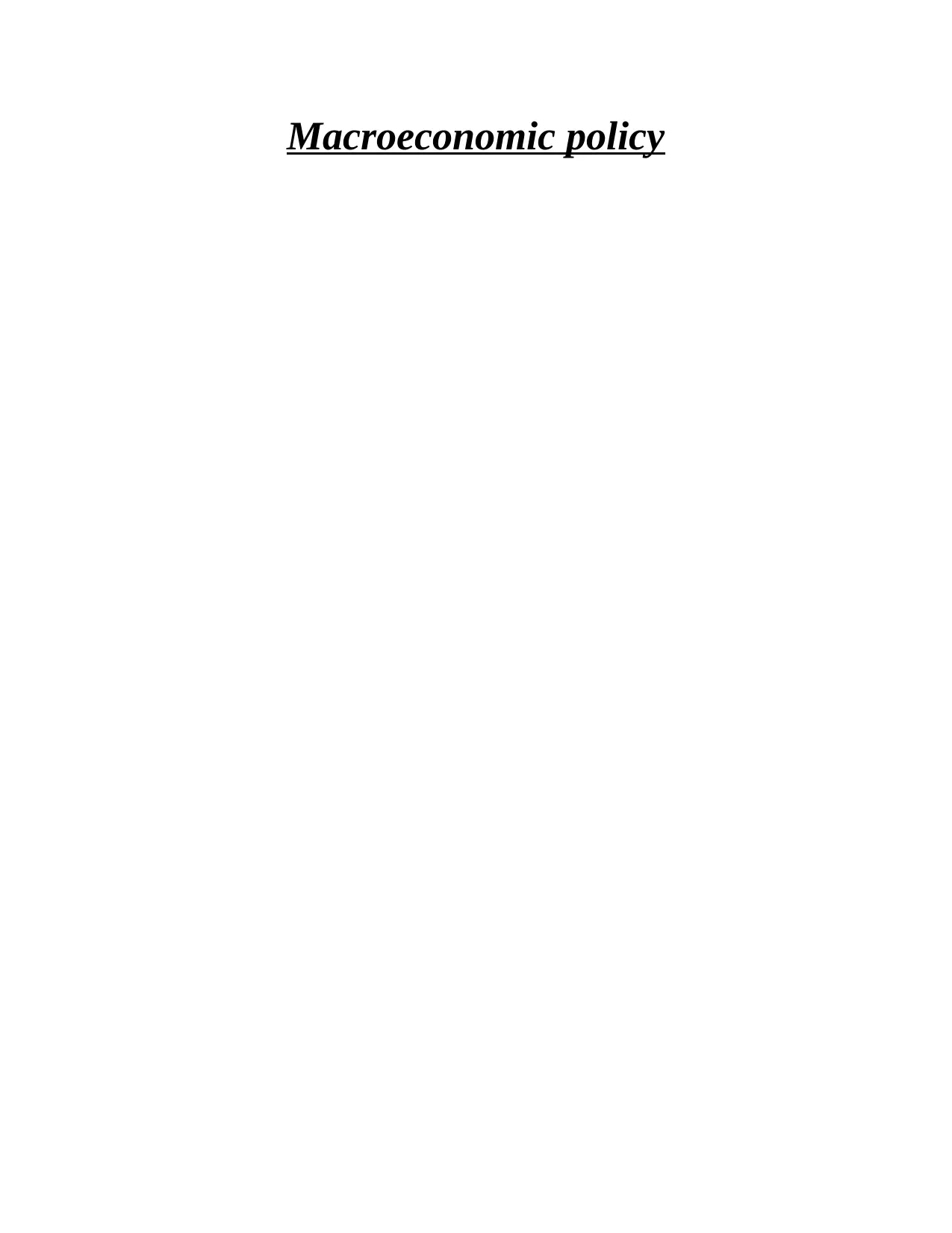
Macroeconomic policy
Paraphrase This Document
Need a fresh take? Get an instant paraphrase of this document with our AI Paraphraser
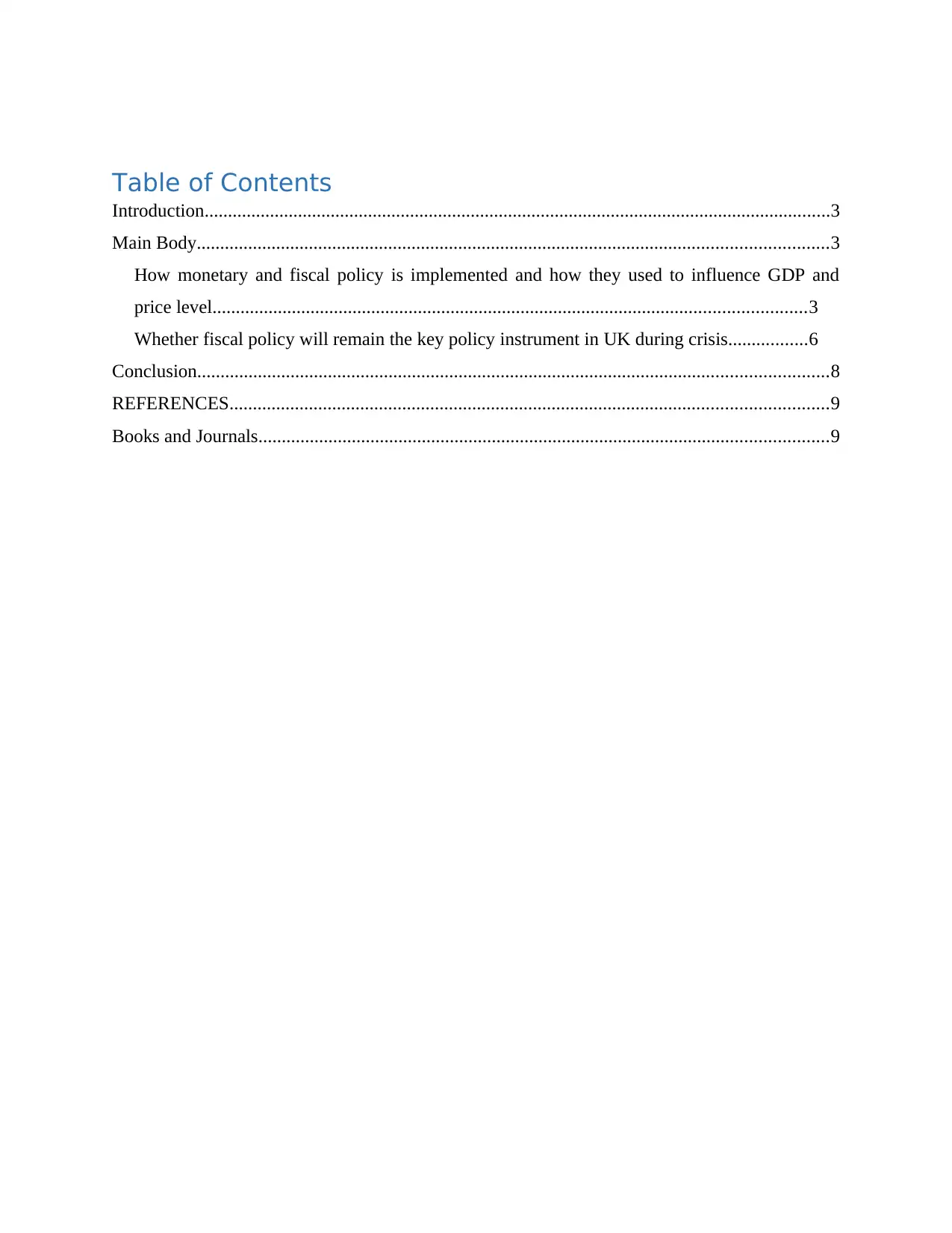
Table of Contents
Introduction......................................................................................................................................3
Main Body.......................................................................................................................................3
How monetary and fiscal policy is implemented and how they used to influence GDP and
price level...............................................................................................................................3
Whether fiscal policy will remain the key policy instrument in UK during crisis.................6
Conclusion.......................................................................................................................................8
REFERENCES................................................................................................................................9
Books and Journals..........................................................................................................................9
Introduction......................................................................................................................................3
Main Body.......................................................................................................................................3
How monetary and fiscal policy is implemented and how they used to influence GDP and
price level...............................................................................................................................3
Whether fiscal policy will remain the key policy instrument in UK during crisis.................6
Conclusion.......................................................................................................................................8
REFERENCES................................................................................................................................9
Books and Journals..........................................................................................................................9
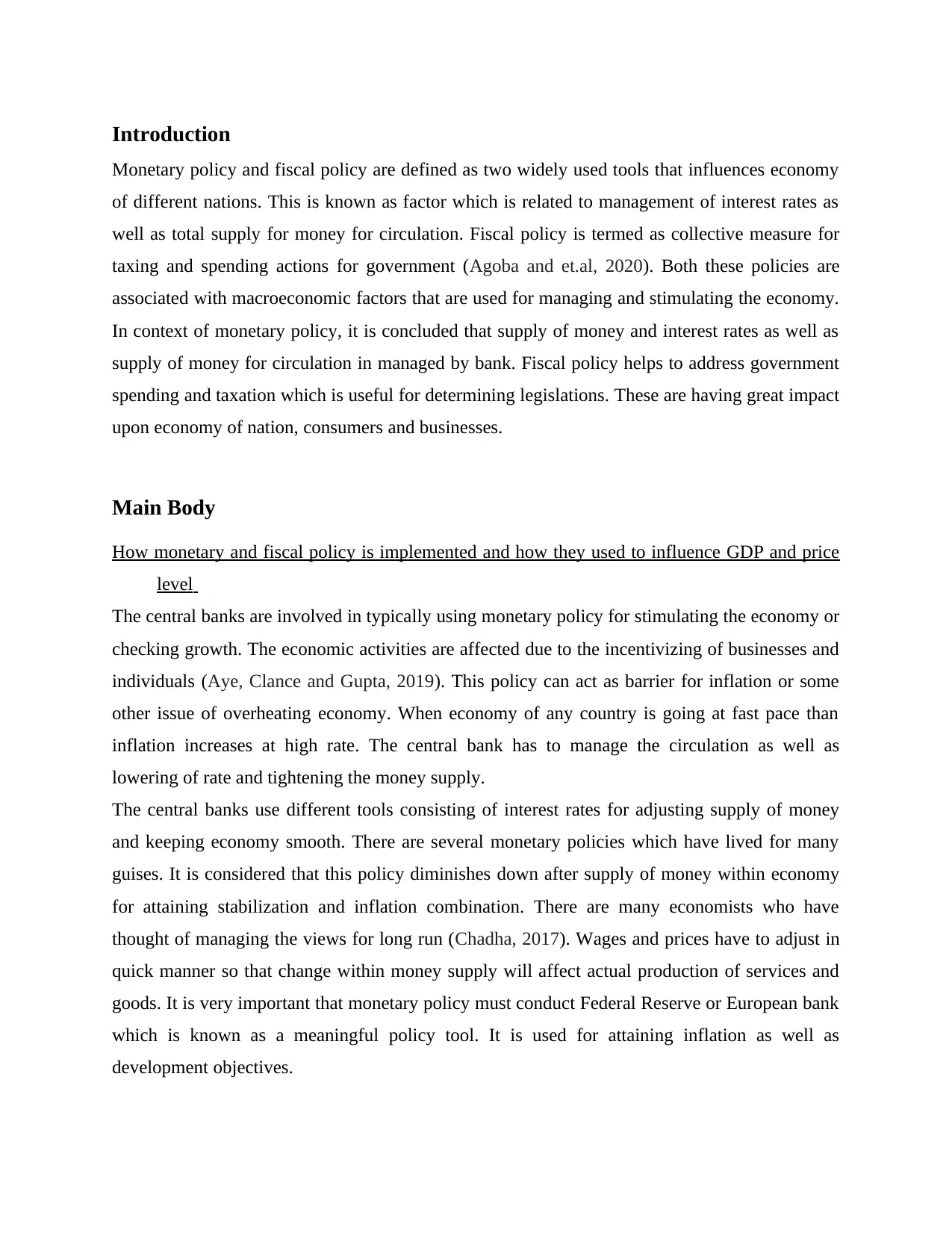
Introduction
Monetary policy and fiscal policy are defined as two widely used tools that influences economy
of different nations. This is known as factor which is related to management of interest rates as
well as total supply for money for circulation. Fiscal policy is termed as collective measure for
taxing and spending actions for government (Agoba and et.al, 2020). Both these policies are
associated with macroeconomic factors that are used for managing and stimulating the economy.
In context of monetary policy, it is concluded that supply of money and interest rates as well as
supply of money for circulation in managed by bank. Fiscal policy helps to address government
spending and taxation which is useful for determining legislations. These are having great impact
upon economy of nation, consumers and businesses.
Main Body
How monetary and fiscal policy is implemented and how they used to influence GDP and price
level
The central banks are involved in typically using monetary policy for stimulating the economy or
checking growth. The economic activities are affected due to the incentivizing of businesses and
individuals (Aye, Clance and Gupta, 2019). This policy can act as barrier for inflation or some
other issue of overheating economy. When economy of any country is going at fast pace than
inflation increases at high rate. The central bank has to manage the circulation as well as
lowering of rate and tightening the money supply.
The central banks use different tools consisting of interest rates for adjusting supply of money
and keeping economy smooth. There are several monetary policies which have lived for many
guises. It is considered that this policy diminishes down after supply of money within economy
for attaining stabilization and inflation combination. There are many economists who have
thought of managing the views for long run (Chadha, 2017). Wages and prices have to adjust in
quick manner so that change within money supply will affect actual production of services and
goods. It is very important that monetary policy must conduct Federal Reserve or European bank
which is known as a meaningful policy tool. It is used for attaining inflation as well as
development objectives.
Monetary policy and fiscal policy are defined as two widely used tools that influences economy
of different nations. This is known as factor which is related to management of interest rates as
well as total supply for money for circulation. Fiscal policy is termed as collective measure for
taxing and spending actions for government (Agoba and et.al, 2020). Both these policies are
associated with macroeconomic factors that are used for managing and stimulating the economy.
In context of monetary policy, it is concluded that supply of money and interest rates as well as
supply of money for circulation in managed by bank. Fiscal policy helps to address government
spending and taxation which is useful for determining legislations. These are having great impact
upon economy of nation, consumers and businesses.
Main Body
How monetary and fiscal policy is implemented and how they used to influence GDP and price
level
The central banks are involved in typically using monetary policy for stimulating the economy or
checking growth. The economic activities are affected due to the incentivizing of businesses and
individuals (Aye, Clance and Gupta, 2019). This policy can act as barrier for inflation or some
other issue of overheating economy. When economy of any country is going at fast pace than
inflation increases at high rate. The central bank has to manage the circulation as well as
lowering of rate and tightening the money supply.
The central banks use different tools consisting of interest rates for adjusting supply of money
and keeping economy smooth. There are several monetary policies which have lived for many
guises. It is considered that this policy diminishes down after supply of money within economy
for attaining stabilization and inflation combination. There are many economists who have
thought of managing the views for long run (Chadha, 2017). Wages and prices have to adjust in
quick manner so that change within money supply will affect actual production of services and
goods. It is very important that monetary policy must conduct Federal Reserve or European bank
which is known as a meaningful policy tool. It is used for attaining inflation as well as
development objectives.
⊘ This is a preview!⊘
Do you want full access?
Subscribe today to unlock all pages.

Trusted by 1+ million students worldwide
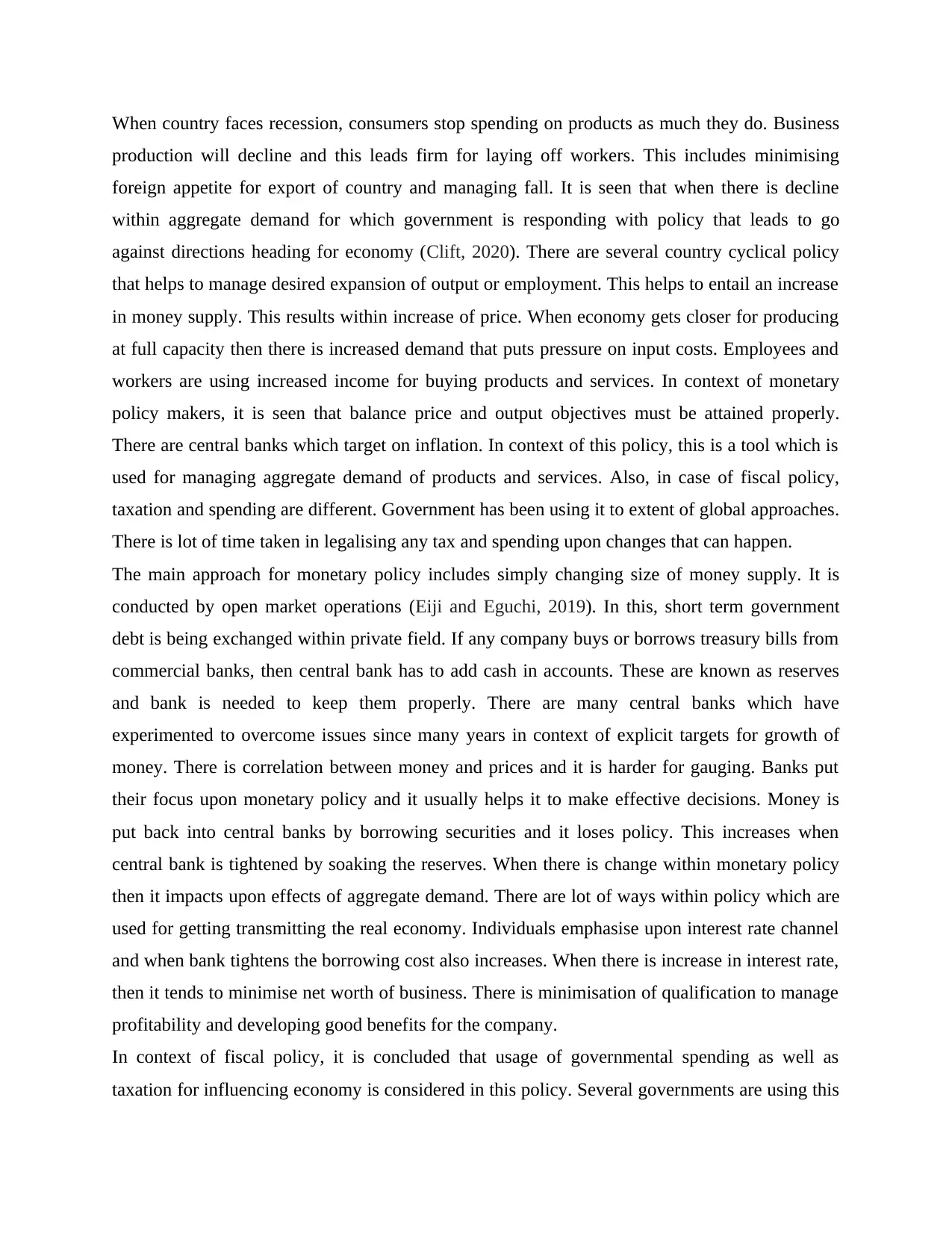
When country faces recession, consumers stop spending on products as much they do. Business
production will decline and this leads firm for laying off workers. This includes minimising
foreign appetite for export of country and managing fall. It is seen that when there is decline
within aggregate demand for which government is responding with policy that leads to go
against directions heading for economy (Clift, 2020). There are several country cyclical policy
that helps to manage desired expansion of output or employment. This helps to entail an increase
in money supply. This results within increase of price. When economy gets closer for producing
at full capacity then there is increased demand that puts pressure on input costs. Employees and
workers are using increased income for buying products and services. In context of monetary
policy makers, it is seen that balance price and output objectives must be attained properly.
There are central banks which target on inflation. In context of this policy, this is a tool which is
used for managing aggregate demand of products and services. Also, in case of fiscal policy,
taxation and spending are different. Government has been using it to extent of global approaches.
There is lot of time taken in legalising any tax and spending upon changes that can happen.
The main approach for monetary policy includes simply changing size of money supply. It is
conducted by open market operations (Eiji and Eguchi, 2019). In this, short term government
debt is being exchanged within private field. If any company buys or borrows treasury bills from
commercial banks, then central bank has to add cash in accounts. These are known as reserves
and bank is needed to keep them properly. There are many central banks which have
experimented to overcome issues since many years in context of explicit targets for growth of
money. There is correlation between money and prices and it is harder for gauging. Banks put
their focus upon monetary policy and it usually helps it to make effective decisions. Money is
put back into central banks by borrowing securities and it loses policy. This increases when
central bank is tightened by soaking the reserves. When there is change within monetary policy
then it impacts upon effects of aggregate demand. There are lot of ways within policy which are
used for getting transmitting the real economy. Individuals emphasise upon interest rate channel
and when bank tightens the borrowing cost also increases. When there is increase in interest rate,
then it tends to minimise net worth of business. There is minimisation of qualification to manage
profitability and developing good benefits for the company.
In context of fiscal policy, it is concluded that usage of governmental spending as well as
taxation for influencing economy is considered in this policy. Several governments are using this
production will decline and this leads firm for laying off workers. This includes minimising
foreign appetite for export of country and managing fall. It is seen that when there is decline
within aggregate demand for which government is responding with policy that leads to go
against directions heading for economy (Clift, 2020). There are several country cyclical policy
that helps to manage desired expansion of output or employment. This helps to entail an increase
in money supply. This results within increase of price. When economy gets closer for producing
at full capacity then there is increased demand that puts pressure on input costs. Employees and
workers are using increased income for buying products and services. In context of monetary
policy makers, it is seen that balance price and output objectives must be attained properly.
There are central banks which target on inflation. In context of this policy, this is a tool which is
used for managing aggregate demand of products and services. Also, in case of fiscal policy,
taxation and spending are different. Government has been using it to extent of global approaches.
There is lot of time taken in legalising any tax and spending upon changes that can happen.
The main approach for monetary policy includes simply changing size of money supply. It is
conducted by open market operations (Eiji and Eguchi, 2019). In this, short term government
debt is being exchanged within private field. If any company buys or borrows treasury bills from
commercial banks, then central bank has to add cash in accounts. These are known as reserves
and bank is needed to keep them properly. There are many central banks which have
experimented to overcome issues since many years in context of explicit targets for growth of
money. There is correlation between money and prices and it is harder for gauging. Banks put
their focus upon monetary policy and it usually helps it to make effective decisions. Money is
put back into central banks by borrowing securities and it loses policy. This increases when
central bank is tightened by soaking the reserves. When there is change within monetary policy
then it impacts upon effects of aggregate demand. There are lot of ways within policy which are
used for getting transmitting the real economy. Individuals emphasise upon interest rate channel
and when bank tightens the borrowing cost also increases. When there is increase in interest rate,
then it tends to minimise net worth of business. There is minimisation of qualification to manage
profitability and developing good benefits for the company.
In context of fiscal policy, it is concluded that usage of governmental spending as well as
taxation for influencing economy is considered in this policy. Several governments are using this
Paraphrase This Document
Need a fresh take? Get an instant paraphrase of this document with our AI Paraphraser
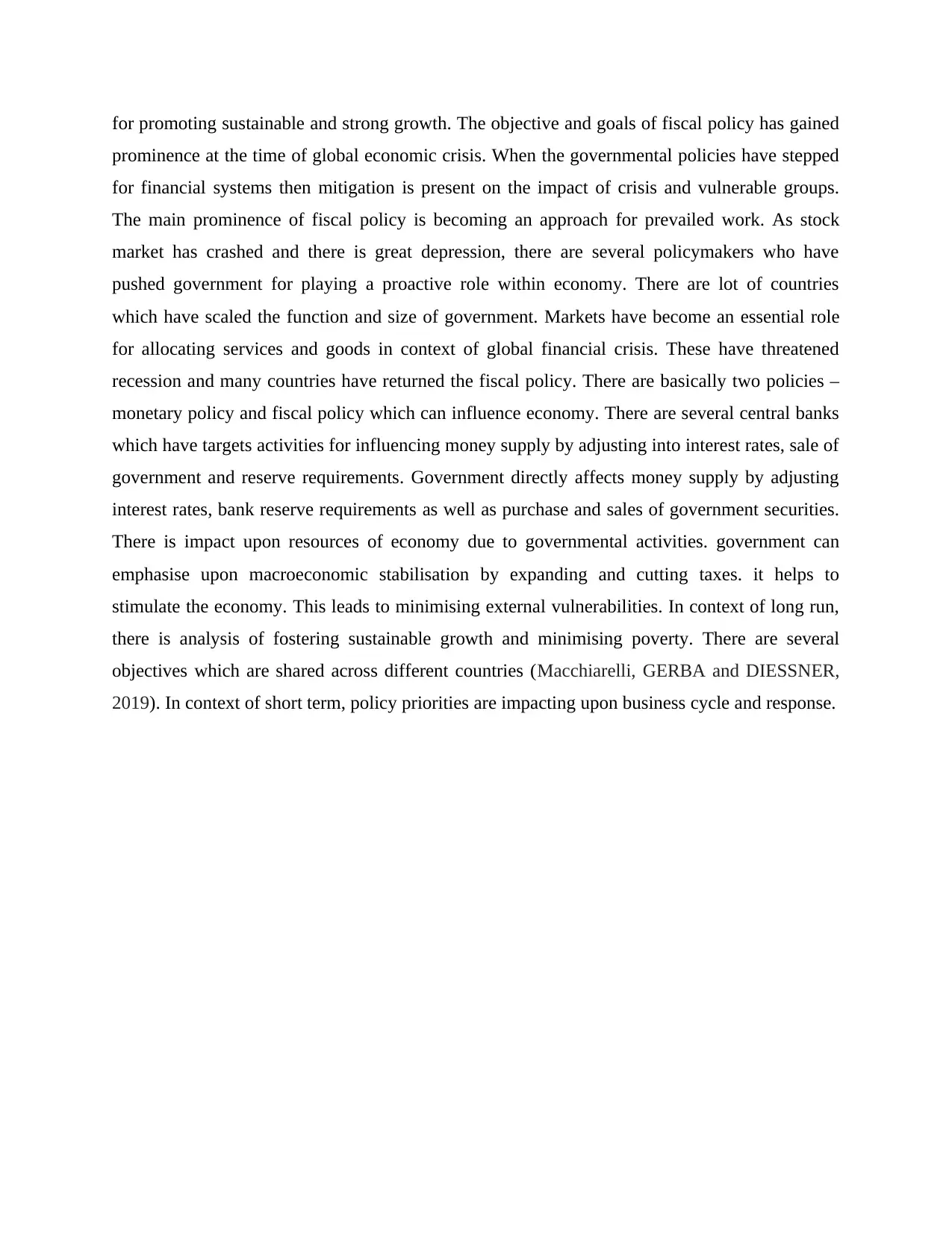
for promoting sustainable and strong growth. The objective and goals of fiscal policy has gained
prominence at the time of global economic crisis. When the governmental policies have stepped
for financial systems then mitigation is present on the impact of crisis and vulnerable groups.
The main prominence of fiscal policy is becoming an approach for prevailed work. As stock
market has crashed and there is great depression, there are several policymakers who have
pushed government for playing a proactive role within economy. There are lot of countries
which have scaled the function and size of government. Markets have become an essential role
for allocating services and goods in context of global financial crisis. These have threatened
recession and many countries have returned the fiscal policy. There are basically two policies –
monetary policy and fiscal policy which can influence economy. There are several central banks
which have targets activities for influencing money supply by adjusting into interest rates, sale of
government and reserve requirements. Government directly affects money supply by adjusting
interest rates, bank reserve requirements as well as purchase and sales of government securities.
There is impact upon resources of economy due to governmental activities. government can
emphasise upon macroeconomic stabilisation by expanding and cutting taxes. it helps to
stimulate the economy. This leads to minimising external vulnerabilities. In context of long run,
there is analysis of fostering sustainable growth and minimising poverty. There are several
objectives which are shared across different countries (Macchiarelli, GERBA and DIESSNER,
2019). In context of short term, policy priorities are impacting upon business cycle and response.
prominence at the time of global economic crisis. When the governmental policies have stepped
for financial systems then mitigation is present on the impact of crisis and vulnerable groups.
The main prominence of fiscal policy is becoming an approach for prevailed work. As stock
market has crashed and there is great depression, there are several policymakers who have
pushed government for playing a proactive role within economy. There are lot of countries
which have scaled the function and size of government. Markets have become an essential role
for allocating services and goods in context of global financial crisis. These have threatened
recession and many countries have returned the fiscal policy. There are basically two policies –
monetary policy and fiscal policy which can influence economy. There are several central banks
which have targets activities for influencing money supply by adjusting into interest rates, sale of
government and reserve requirements. Government directly affects money supply by adjusting
interest rates, bank reserve requirements as well as purchase and sales of government securities.
There is impact upon resources of economy due to governmental activities. government can
emphasise upon macroeconomic stabilisation by expanding and cutting taxes. it helps to
stimulate the economy. This leads to minimising external vulnerabilities. In context of long run,
there is analysis of fostering sustainable growth and minimising poverty. There are several
objectives which are shared across different countries (Macchiarelli, GERBA and DIESSNER,
2019). In context of short term, policy priorities are impacting upon business cycle and response.
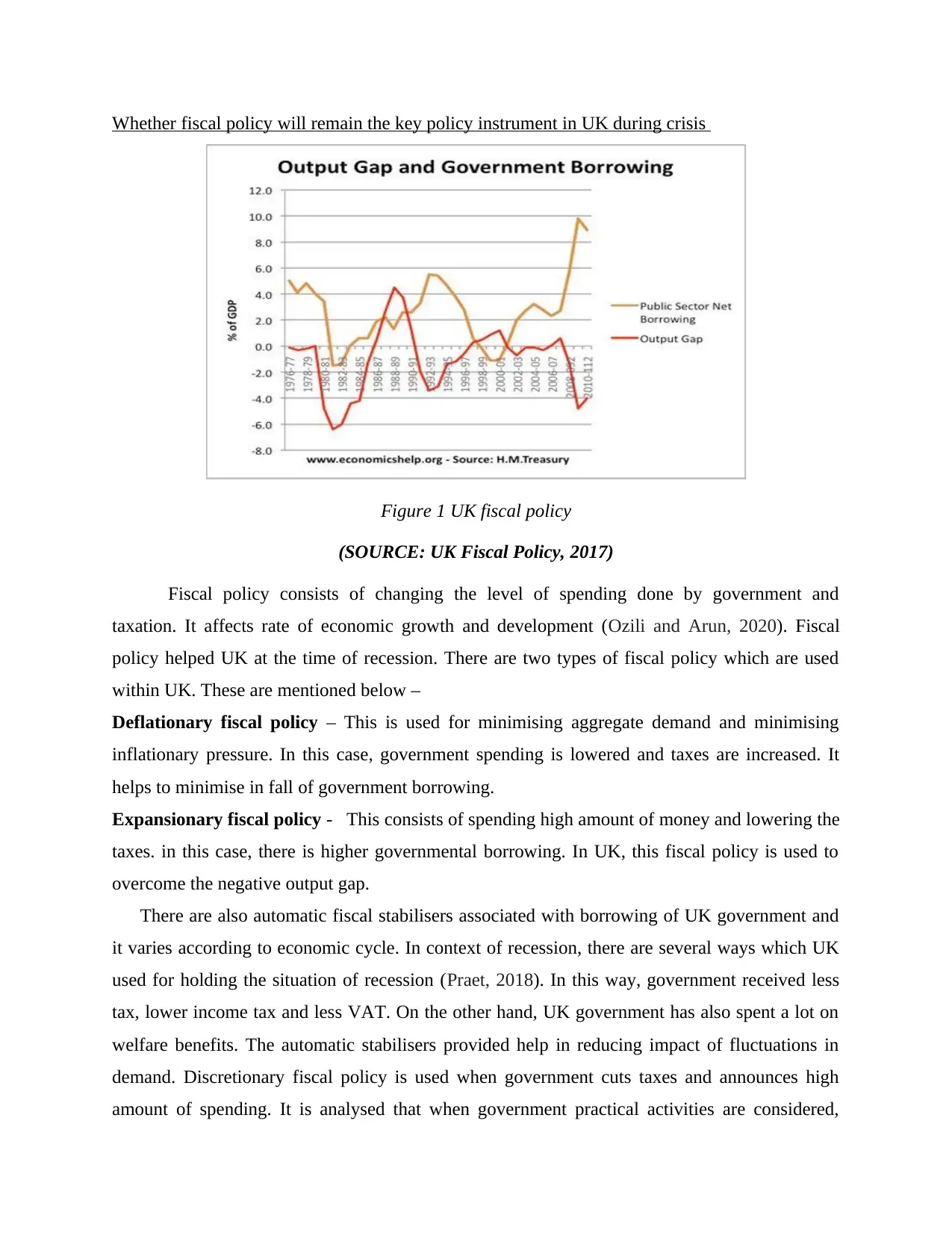
Whether fiscal policy will remain the key policy instrument in UK during crisis
Figure 1 UK fiscal policy
(SOURCE: UK Fiscal Policy, 2017)
Fiscal policy consists of changing the level of spending done by government and
taxation. It affects rate of economic growth and development (Ozili and Arun, 2020). Fiscal
policy helped UK at the time of recession. There are two types of fiscal policy which are used
within UK. These are mentioned below –
Deflationary fiscal policy – This is used for minimising aggregate demand and minimising
inflationary pressure. In this case, government spending is lowered and taxes are increased. It
helps to minimise in fall of government borrowing.
Expansionary fiscal policy - This consists of spending high amount of money and lowering the
taxes. in this case, there is higher governmental borrowing. In UK, this fiscal policy is used to
overcome the negative output gap.
There are also automatic fiscal stabilisers associated with borrowing of UK government and
it varies according to economic cycle. In context of recession, there are several ways which UK
used for holding the situation of recession (Praet, 2018). In this way, government received less
tax, lower income tax and less VAT. On the other hand, UK government has also spent a lot on
welfare benefits. The automatic stabilisers provided help in reducing impact of fluctuations in
demand. Discretionary fiscal policy is used when government cuts taxes and announces high
amount of spending. It is analysed that when government practical activities are considered,
Figure 1 UK fiscal policy
(SOURCE: UK Fiscal Policy, 2017)
Fiscal policy consists of changing the level of spending done by government and
taxation. It affects rate of economic growth and development (Ozili and Arun, 2020). Fiscal
policy helped UK at the time of recession. There are two types of fiscal policy which are used
within UK. These are mentioned below –
Deflationary fiscal policy – This is used for minimising aggregate demand and minimising
inflationary pressure. In this case, government spending is lowered and taxes are increased. It
helps to minimise in fall of government borrowing.
Expansionary fiscal policy - This consists of spending high amount of money and lowering the
taxes. in this case, there is higher governmental borrowing. In UK, this fiscal policy is used to
overcome the negative output gap.
There are also automatic fiscal stabilisers associated with borrowing of UK government and
it varies according to economic cycle. In context of recession, there are several ways which UK
used for holding the situation of recession (Praet, 2018). In this way, government received less
tax, lower income tax and less VAT. On the other hand, UK government has also spent a lot on
welfare benefits. The automatic stabilisers provided help in reducing impact of fluctuations in
demand. Discretionary fiscal policy is used when government cuts taxes and announces high
amount of spending. It is analysed that when government practical activities are considered,
⊘ This is a preview!⊘
Do you want full access?
Subscribe today to unlock all pages.

Trusted by 1+ million students worldwide
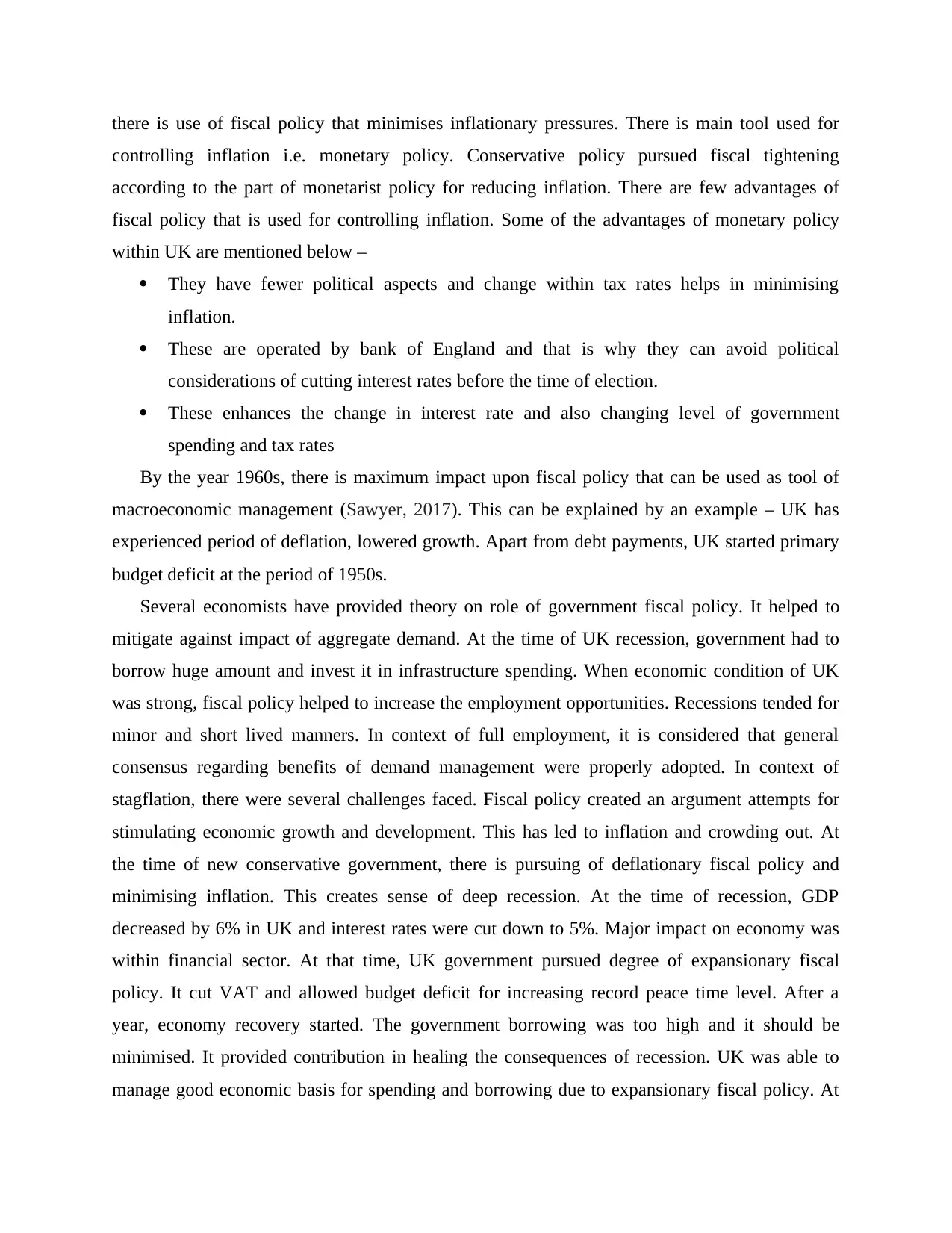
there is use of fiscal policy that minimises inflationary pressures. There is main tool used for
controlling inflation i.e. monetary policy. Conservative policy pursued fiscal tightening
according to the part of monetarist policy for reducing inflation. There are few advantages of
fiscal policy that is used for controlling inflation. Some of the advantages of monetary policy
within UK are mentioned below –
They have fewer political aspects and change within tax rates helps in minimising
inflation.
These are operated by bank of England and that is why they can avoid political
considerations of cutting interest rates before the time of election.
These enhances the change in interest rate and also changing level of government
spending and tax rates
By the year 1960s, there is maximum impact upon fiscal policy that can be used as tool of
macroeconomic management (Sawyer, 2017). This can be explained by an example – UK has
experienced period of deflation, lowered growth. Apart from debt payments, UK started primary
budget deficit at the period of 1950s.
Several economists have provided theory on role of government fiscal policy. It helped to
mitigate against impact of aggregate demand. At the time of UK recession, government had to
borrow huge amount and invest it in infrastructure spending. When economic condition of UK
was strong, fiscal policy helped to increase the employment opportunities. Recessions tended for
minor and short lived manners. In context of full employment, it is considered that general
consensus regarding benefits of demand management were properly adopted. In context of
stagflation, there were several challenges faced. Fiscal policy created an argument attempts for
stimulating economic growth and development. This has led to inflation and crowding out. At
the time of new conservative government, there is pursuing of deflationary fiscal policy and
minimising inflation. This creates sense of deep recession. At the time of recession, GDP
decreased by 6% in UK and interest rates were cut down to 5%. Major impact on economy was
within financial sector. At that time, UK government pursued degree of expansionary fiscal
policy. It cut VAT and allowed budget deficit for increasing record peace time level. After a
year, economy recovery started. The government borrowing was too high and it should be
minimised. It provided contribution in healing the consequences of recession. UK was able to
manage good economic basis for spending and borrowing due to expansionary fiscal policy. At
controlling inflation i.e. monetary policy. Conservative policy pursued fiscal tightening
according to the part of monetarist policy for reducing inflation. There are few advantages of
fiscal policy that is used for controlling inflation. Some of the advantages of monetary policy
within UK are mentioned below –
They have fewer political aspects and change within tax rates helps in minimising
inflation.
These are operated by bank of England and that is why they can avoid political
considerations of cutting interest rates before the time of election.
These enhances the change in interest rate and also changing level of government
spending and tax rates
By the year 1960s, there is maximum impact upon fiscal policy that can be used as tool of
macroeconomic management (Sawyer, 2017). This can be explained by an example – UK has
experienced period of deflation, lowered growth. Apart from debt payments, UK started primary
budget deficit at the period of 1950s.
Several economists have provided theory on role of government fiscal policy. It helped to
mitigate against impact of aggregate demand. At the time of UK recession, government had to
borrow huge amount and invest it in infrastructure spending. When economic condition of UK
was strong, fiscal policy helped to increase the employment opportunities. Recessions tended for
minor and short lived manners. In context of full employment, it is considered that general
consensus regarding benefits of demand management were properly adopted. In context of
stagflation, there were several challenges faced. Fiscal policy created an argument attempts for
stimulating economic growth and development. This has led to inflation and crowding out. At
the time of new conservative government, there is pursuing of deflationary fiscal policy and
minimising inflation. This creates sense of deep recession. At the time of recession, GDP
decreased by 6% in UK and interest rates were cut down to 5%. Major impact on economy was
within financial sector. At that time, UK government pursued degree of expansionary fiscal
policy. It cut VAT and allowed budget deficit for increasing record peace time level. After a
year, economy recovery started. The government borrowing was too high and it should be
minimised. It provided contribution in healing the consequences of recession. UK was able to
manage good economic basis for spending and borrowing due to expansionary fiscal policy. At
Paraphrase This Document
Need a fresh take? Get an instant paraphrase of this document with our AI Paraphraser
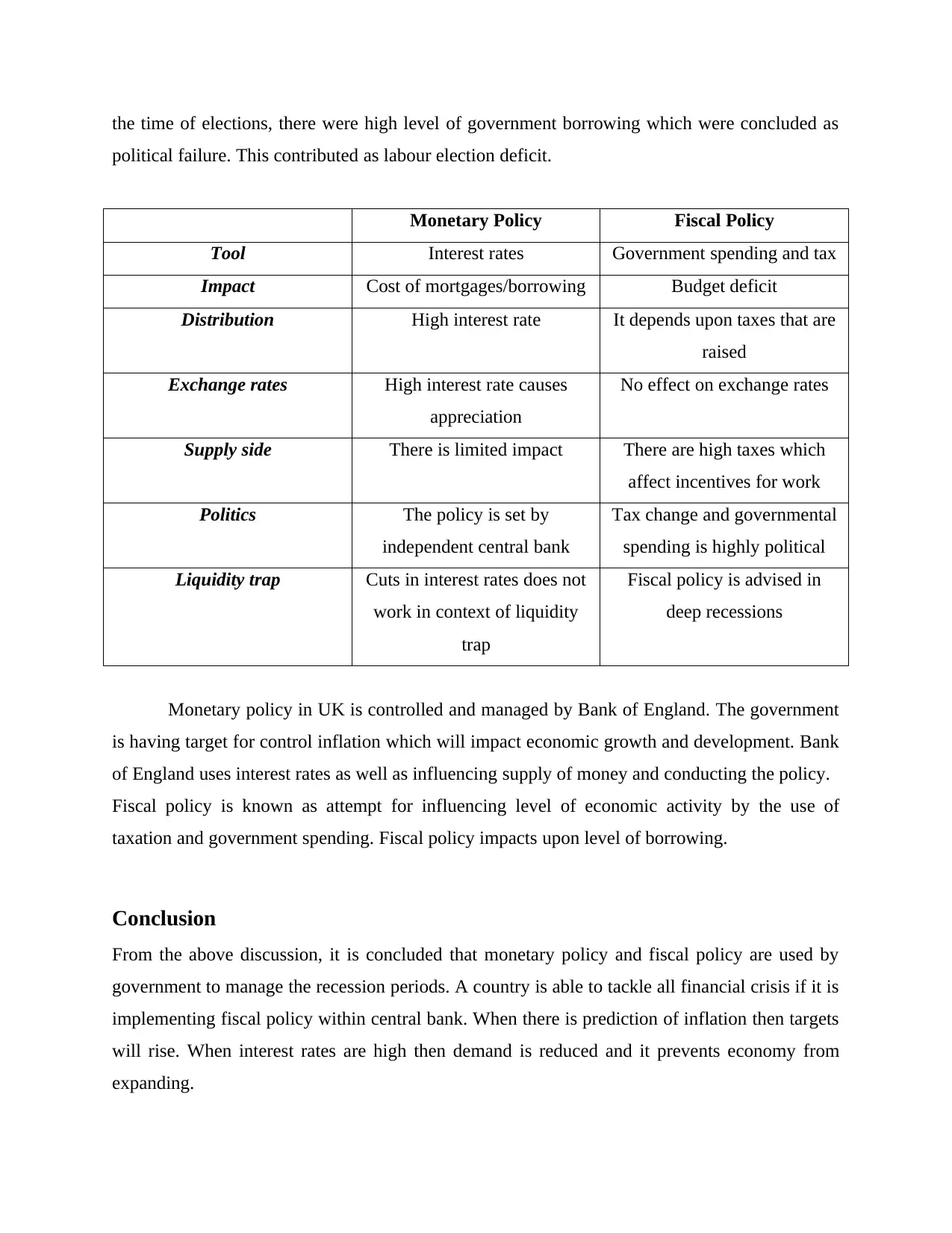
the time of elections, there were high level of government borrowing which were concluded as
political failure. This contributed as labour election deficit.
Monetary Policy Fiscal Policy
Tool Interest rates Government spending and tax
Impact Cost of mortgages/borrowing Budget deficit
Distribution High interest rate It depends upon taxes that are
raised
Exchange rates High interest rate causes
appreciation
No effect on exchange rates
Supply side There is limited impact There are high taxes which
affect incentives for work
Politics The policy is set by
independent central bank
Tax change and governmental
spending is highly political
Liquidity trap Cuts in interest rates does not
work in context of liquidity
trap
Fiscal policy is advised in
deep recessions
Monetary policy in UK is controlled and managed by Bank of England. The government
is having target for control inflation which will impact economic growth and development. Bank
of England uses interest rates as well as influencing supply of money and conducting the policy.
Fiscal policy is known as attempt for influencing level of economic activity by the use of
taxation and government spending. Fiscal policy impacts upon level of borrowing.
Conclusion
From the above discussion, it is concluded that monetary policy and fiscal policy are used by
government to manage the recession periods. A country is able to tackle all financial crisis if it is
implementing fiscal policy within central bank. When there is prediction of inflation then targets
will rise. When interest rates are high then demand is reduced and it prevents economy from
expanding.
political failure. This contributed as labour election deficit.
Monetary Policy Fiscal Policy
Tool Interest rates Government spending and tax
Impact Cost of mortgages/borrowing Budget deficit
Distribution High interest rate It depends upon taxes that are
raised
Exchange rates High interest rate causes
appreciation
No effect on exchange rates
Supply side There is limited impact There are high taxes which
affect incentives for work
Politics The policy is set by
independent central bank
Tax change and governmental
spending is highly political
Liquidity trap Cuts in interest rates does not
work in context of liquidity
trap
Fiscal policy is advised in
deep recessions
Monetary policy in UK is controlled and managed by Bank of England. The government
is having target for control inflation which will impact economic growth and development. Bank
of England uses interest rates as well as influencing supply of money and conducting the policy.
Fiscal policy is known as attempt for influencing level of economic activity by the use of
taxation and government spending. Fiscal policy impacts upon level of borrowing.
Conclusion
From the above discussion, it is concluded that monetary policy and fiscal policy are used by
government to manage the recession periods. A country is able to tackle all financial crisis if it is
implementing fiscal policy within central bank. When there is prediction of inflation then targets
will rise. When interest rates are high then demand is reduced and it prevents economy from
expanding.
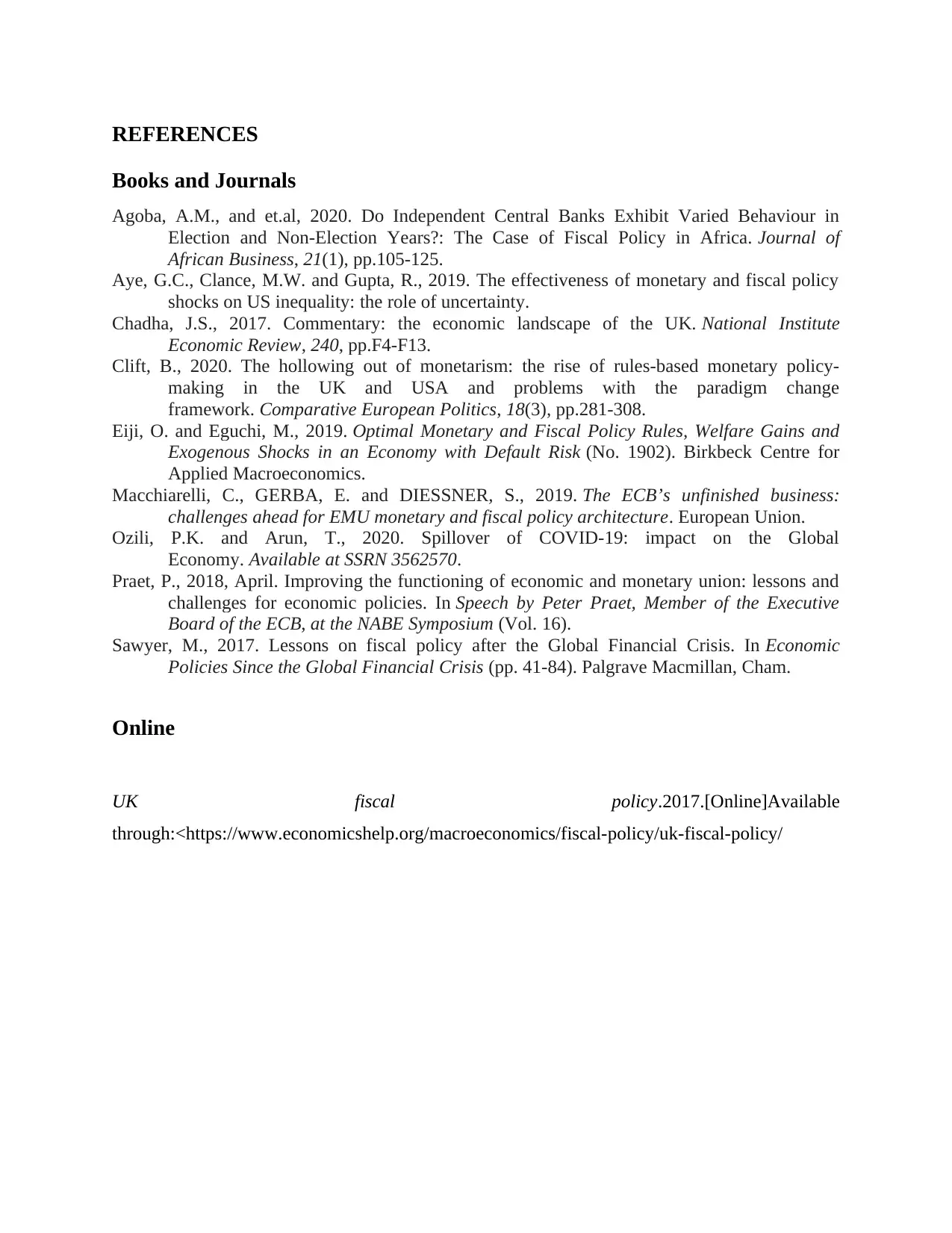
REFERENCES
Books and Journals
Agoba, A.M., and et.al, 2020. Do Independent Central Banks Exhibit Varied Behaviour in
Election and Non-Election Years?: The Case of Fiscal Policy in Africa. Journal of
African Business, 21(1), pp.105-125.
Aye, G.C., Clance, M.W. and Gupta, R., 2019. The effectiveness of monetary and fiscal policy
shocks on US inequality: the role of uncertainty.
Chadha, J.S., 2017. Commentary: the economic landscape of the UK. National Institute
Economic Review, 240, pp.F4-F13.
Clift, B., 2020. The hollowing out of monetarism: the rise of rules-based monetary policy-
making in the UK and USA and problems with the paradigm change
framework. Comparative European Politics, 18(3), pp.281-308.
Eiji, O. and Eguchi, M., 2019. Optimal Monetary and Fiscal Policy Rules, Welfare Gains and
Exogenous Shocks in an Economy with Default Risk (No. 1902). Birkbeck Centre for
Applied Macroeconomics.
Macchiarelli, C., GERBA, E. and DIESSNER, S., 2019. The ECB’s unfinished business:
challenges ahead for EMU monetary and fiscal policy architecture. European Union.
Ozili, P.K. and Arun, T., 2020. Spillover of COVID-19: impact on the Global
Economy. Available at SSRN 3562570.
Praet, P., 2018, April. Improving the functioning of economic and monetary union: lessons and
challenges for economic policies. In Speech by Peter Praet, Member of the Executive
Board of the ECB, at the NABE Symposium (Vol. 16).
Sawyer, M., 2017. Lessons on fiscal policy after the Global Financial Crisis. In Economic
Policies Since the Global Financial Crisis (pp. 41-84). Palgrave Macmillan, Cham.
Online
UK fiscal policy.2017.[Online]Available
through:<https://www.economicshelp.org/macroeconomics/fiscal-policy/uk-fiscal-policy/
Books and Journals
Agoba, A.M., and et.al, 2020. Do Independent Central Banks Exhibit Varied Behaviour in
Election and Non-Election Years?: The Case of Fiscal Policy in Africa. Journal of
African Business, 21(1), pp.105-125.
Aye, G.C., Clance, M.W. and Gupta, R., 2019. The effectiveness of monetary and fiscal policy
shocks on US inequality: the role of uncertainty.
Chadha, J.S., 2017. Commentary: the economic landscape of the UK. National Institute
Economic Review, 240, pp.F4-F13.
Clift, B., 2020. The hollowing out of monetarism: the rise of rules-based monetary policy-
making in the UK and USA and problems with the paradigm change
framework. Comparative European Politics, 18(3), pp.281-308.
Eiji, O. and Eguchi, M., 2019. Optimal Monetary and Fiscal Policy Rules, Welfare Gains and
Exogenous Shocks in an Economy with Default Risk (No. 1902). Birkbeck Centre for
Applied Macroeconomics.
Macchiarelli, C., GERBA, E. and DIESSNER, S., 2019. The ECB’s unfinished business:
challenges ahead for EMU monetary and fiscal policy architecture. European Union.
Ozili, P.K. and Arun, T., 2020. Spillover of COVID-19: impact on the Global
Economy. Available at SSRN 3562570.
Praet, P., 2018, April. Improving the functioning of economic and monetary union: lessons and
challenges for economic policies. In Speech by Peter Praet, Member of the Executive
Board of the ECB, at the NABE Symposium (Vol. 16).
Sawyer, M., 2017. Lessons on fiscal policy after the Global Financial Crisis. In Economic
Policies Since the Global Financial Crisis (pp. 41-84). Palgrave Macmillan, Cham.
Online
UK fiscal policy.2017.[Online]Available
through:<https://www.economicshelp.org/macroeconomics/fiscal-policy/uk-fiscal-policy/
⊘ This is a preview!⊘
Do you want full access?
Subscribe today to unlock all pages.

Trusted by 1+ million students worldwide
1 out of 9
Related Documents
Your All-in-One AI-Powered Toolkit for Academic Success.
+13062052269
info@desklib.com
Available 24*7 on WhatsApp / Email
![[object Object]](/_next/static/media/star-bottom.7253800d.svg)
Unlock your academic potential
Copyright © 2020–2026 A2Z Services. All Rights Reserved. Developed and managed by ZUCOL.




